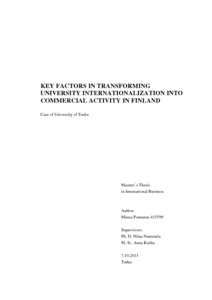Key factors in transforming university internationalization into commercial activity in Finland. Case of University of Turku
Poutanen, Minna (2013-10-07)
Key factors in transforming university internationalization into commercial activity in Finland. Case of University of Turku
Poutanen, Minna
(07.10.2013)
Julkaisun pysyvä osoite on:
https://urn.fi/URN:NBN:fi-fe201311067004
https://urn.fi/URN:NBN:fi-fe201311067004
Kuvaus
siirretty Doriasta
Tiivistelmä
Globalization, developments in ICT, emergence of knowledge society and other changes have reformed the environment for international higher education during the past few decades. Consequently, higher education sector has moved towards more marketing-oriented system, and universities have started to undertake commercial activities as part of their internationalization. This development has emerged to Finland as well, which forms the basis for this study. The purpose is to examine commercialization in Finnish university landscape and to investigate the ways Finnish university could capitalize its international activities and educational knowledge for export. The research question of the study is: What are the key factors in transforming university internationalization into commercial activity in the Finnish university landscape? The main problem is further divided into three sub-questions: 1) How can a university internationalize; 2) what are the motivational factors behind university internationalization and commercialization; and 3) how can higher education be developed into export services and products?
The research was conducted as a qualitative case study of University of Turku. Methods used for gathering and examining data were interviewing and document analysis. Primary data was collected through four individual semi-structured interviews, which were conducted face-to-face. Secondary data that included reports, articles and electronic materials such as university web pages, was used to complement the primary data. The results were analyzed by theming the data into three broader categories of internationalization activities; drivers and motivations and; education export activities. After the data was organized in themes, analysis continued by comparing different parts of data and finding patterns that would explain the phenomenon in Finnish universities.
According to the empirical data, University of Turku is currently on the growth state of internationalization with strategies such as internationalization of curriculum, establishment of international research groups, mobility of students and academics, international networking and support services. Commercialization phenomenon is still rather new to the case university, but it has already developed educational products and services for export. The study concludes that university internationalization cannot be directly transformed into commercial activities in the Finnish context, but the universities need to be active in actually creating educational products. The key factors found in this study include: 1) the Finnish government policies behind the current hype of export education; 2) the potential and knowledge capacity of universities for exports; 3) need for additional profits; 4) further internationalization through commercial activities; 5) recognizing and exploiting the specific areas of strength and 6) establishing of cooperative partnerships for better products.
The research was conducted as a qualitative case study of University of Turku. Methods used for gathering and examining data were interviewing and document analysis. Primary data was collected through four individual semi-structured interviews, which were conducted face-to-face. Secondary data that included reports, articles and electronic materials such as university web pages, was used to complement the primary data. The results were analyzed by theming the data into three broader categories of internationalization activities; drivers and motivations and; education export activities. After the data was organized in themes, analysis continued by comparing different parts of data and finding patterns that would explain the phenomenon in Finnish universities.
According to the empirical data, University of Turku is currently on the growth state of internationalization with strategies such as internationalization of curriculum, establishment of international research groups, mobility of students and academics, international networking and support services. Commercialization phenomenon is still rather new to the case university, but it has already developed educational products and services for export. The study concludes that university internationalization cannot be directly transformed into commercial activities in the Finnish context, but the universities need to be active in actually creating educational products. The key factors found in this study include: 1) the Finnish government policies behind the current hype of export education; 2) the potential and knowledge capacity of universities for exports; 3) need for additional profits; 4) further internationalization through commercial activities; 5) recognizing and exploiting the specific areas of strength and 6) establishing of cooperative partnerships for better products.
